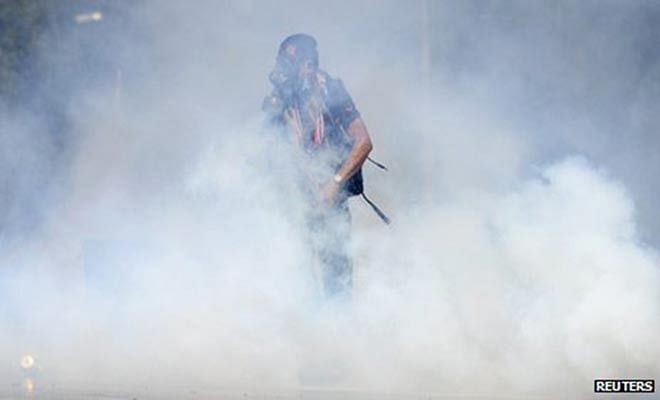Thai protesters call for general strike

The leader of Thailand’s protests, Suthep Thaungsuban, has called for the country’s civil servants to go on strike on Monday.
Bangkok has been hit by anti-government demonstrations for the past nine days.
On Sunday, police fired tear gas and water cannons to repel protesters seeking to storm the prime minister’s office, Government House.
Four people have died in Thailand’s worst political turmoil since the 2010 rallies that ended in violence.
The protesters, who want Prime Minister Yingluck Shinawatra to step down, had declared Sunday the decisive “V-Day” of what they termed a “people’s coup”.
However, despite clashing with security forces, they failed to seize more government buildings or unseat Yingluck.
‘Stop working’
The protests had been largely peaceful until the weekend, when the unrest escalated.
Protesters entered TV stations to ensure a message from leader Suthep was aired, and tried to break into a Bangkok police complex where Yingluck had intended to give interviews, forcing her evacuation.
On Sunday, Suthep, a former opposition party politician, said he had met Yingluck and given her a two-day deadline to resign.
“I told Yingluck that this is the only and last time I see her until power is handed over to the people,” he was quoted as saying.
“There will be no bargaining and it must be finished in two days.”
He also called on civil servants to “stop working for the Thaksin regime and come out and protest”.
Yingluck’s government, which has broad support outside the capital, took office after winning elections in 2011.
However, protesters say her administration is controlled by her brother, exiled ex-leader Thaksin Shinawatra. They want to replace her government with a “People’s Council” instead.
On Friday Yingluck ruled out early elections, telling the BBC that the country was not calm enough for polls. She repeated her call for negotiations to resolve the crisis.
Thailand is facing its largest protests since 2010, when thousands of red-shirt Thaksin supporters occupied key parts of the capital. More than 90 people, mostly civilian protesters, died over the course of the two-month sit-in.

 For all latest news, follow The Daily Star's Google News channel.
For all latest news, follow The Daily Star's Google News channel. 



Comments